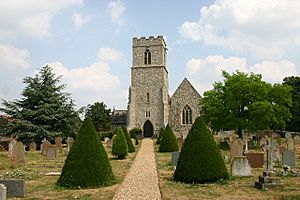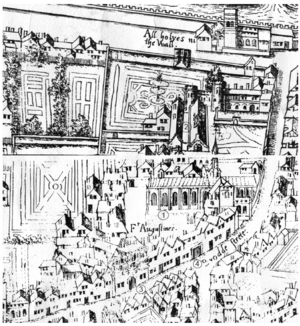Thomas Tuddenham facts for kids
Quick facts for kids
Sir Thomas Tuddenham
|
|
|---|---|
| Born | 10 May 1401 Eriswell, Suffolk |
| Died | 23 February 1462 (aged 60) Tower Hill, London |
| Buried | Austin Friars, London |
| Spouse(s) | Alice Wodehouse |
| Father | Sir Robert Tuddenham |
Sir Thomas Tuddenham (born May 10, 1401 – died February 23, 1462) was an important landowner and government official in Norfolk, England. He worked for the royal court, serving as a manager for the Duchy of Lancaster and as the Keeper of the Great Wardrobe. During the Wars of the Roses, a series of civil wars in England, he supported the Lancastrian side. After the Yorkist side won in 1461, he was accused of plotting against the new king. He was then executed on Tower Hill in London on February 23, 1462.
Contents
Early Life and Family
Thomas Tuddenham was born on May 10, 1401, in Eriswell, a town in Suffolk, England. He was baptized in the local church there. Thomas was the younger son of Sir Robert Tuddenham (who lived from 1366 to 1405) and Margaret Harling.
Starting a Career in Politics
Thomas Tuddenham's older brother, Robert, passed away in 1415. This meant that Thomas inherited the family's lands and properties. However, because he was still a minor (underage), the King took control of his lands and arranged his marriage. In July 1417, Sir John Rodenhale and John Wodehouse were given the responsibility of looking after Thomas.
Around 1418, Thomas Tuddenham married Alice Wodehouse, who was the daughter of John Wodehouse. In March 1423, he officially gained full control of his inherited lands.
Working for the King
On June 30, 1425, Thomas Tuddenham's father-in-law, John Wodehouse, stepped down from his job as steward of the Duchy of Lancaster. This allowed Thomas to take over the position. Around this time, Thomas was also knighted, becoming "Sir Thomas." It is thought that his father-in-law helped him get a job working for Thomas Beaufort, Duke of Exeter, an important nobleman. In 1434, Thomas Tuddenham gained even more land in Norfolk when he inherited the manor of Oxburgh from a relative.
Supporting the Duke of Suffolk
After the Duke of Exeter died in 1426, Sir Thomas Tuddenham became a close supporter of William de la Pole, 1st Duke of Suffolk. The Duke of Suffolk was the most powerful nobleman in Norfolk at that time. Because he was an ally of Suffolk, Sir Thomas received many important jobs and grants in East Anglia and within the royal household of King Henry VI.
He served as the Sheriff of Norfolk and Suffolk in 1432. He was also elected as a Member of Parliament for Suffolk in 1431, and for Norfolk in 1432, 1435, and 1442. On September 29, 1443, he and the Duke of Suffolk were both appointed as chief stewards for the northern parts of the Duchy of Lancaster. Later, on October 26, 1446, Sir Thomas Tuddenham was made the Keeper of the Great Wardrobe in the King's household. This was a significant role, managing the King's clothes, jewels, and other valuable items.
In 1449–1450, Sir Thomas Tuddenham helped fund a trip to Rome for a famous writer and historian named John Capgrave. Capgrave went during a special "Holy Year" and later wrote a book about Rome for Sir Thomas.
Facing Challenges
In 1450, the Duke of Suffolk lost his power. Because Sir Thomas Tuddenham was a close ally of Suffolk, he also faced difficulties. He lost his jobs as a Justice of the Peace in Norfolk, Keeper of the Great Wardrobe, and Steward of the Duchy of Lancaster.
In August 1450, a special group was formed to investigate accusations against Suffolk's allies in East Anglia, including Sir Thomas Tuddenham. This group found Sir Thomas guilty of over 300 offenses and fined him a large sum of money. However, in July of the next year, most of the fine was cancelled, and many charges against him were dropped. By 1457–1458, Sir Thomas had even made peace with the Earl of Oxford, who granted him an annual payment. Even so, Sir Thomas Tuddenham's political influence was not as strong as it had been in the 1440s. He was not fully reinstated as a Justice of the Peace until March 1455.
The Wars of the Roses and Execution
During the Wars of the Roses in the 1450s, Sir Thomas Tuddenham and his friends supported the Lancastrian side. This was the side of Margaret of Anjou, who was the wife of King Henry VI. By the end of 1458, Sir Thomas Tuddenham was appointed Treasurer of the Royal Household, a very important position.
However, the Yorkist side won a major battle in March 1461, and Edward IV became the new King. Soon after, an order was issued for Sir Thomas Tuddenham's arrest, and his lands were taken away. In February 1462, it was claimed that Sir Thomas was involved in a plot against the new King. He was arrested and put on trial for treason. He was sentenced to death by John Tiptoft, 1st Earl of Worcester, along with the Earl of Oxford and others.
Historical records describe the executions:
- On February 20, the Earl of Oxford's son, Aubrey de Vere, was executed on Tower Hill.
- On February 23, Sir Thomas Tuddenham, William Tyrrell, and John Montgomery were also executed on Tower Hill.
- On February 26, the Earl of Oxford was executed on Tower Hill.
Sir Thomas Tuddenham was buried in the church of the Austin Friars in London. His lands, including his manor of Oxburgh, were inherited by his sister, Margaret Tuddenham.
Marriage
Around 1418, Sir Thomas Tuddenham married Alice Wodehouse, the daughter of his guardian, John Wodehouse. They lived together for about seven years. During this time, Alice gave birth to a son who sadly died when he was very young. Later, both Sir Thomas and Alice stated that their marriage had not been fully completed. Alice admitted that her father's chamberlain was the father of her infant son. By 1429, Sir Thomas and Alice were officially separated, and Alice became a nun at Crabhouse Priory in Norfolk. Their marriage was formally cancelled on November 22, 1436.
 | Laphonza Butler |
 | Daisy Bates |
 | Elizabeth Piper Ensley |



